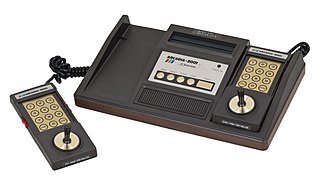 W
WThe Apple Bandai Pippin, stylized PiP P!N, is a multimedia technology console, designed by Apple Computer. The console is based on the Apple Pippin platform – a derivative of the Apple Macintosh platform. Bandai produced the ATMARK and @WORLD consoles between 1996 and 1997. It was sold at $599.
 W
WThe Apple Pippin is a defunct open multimedia technology platform, designed by Apple Computer, and marketed as PiPP!N. According to Apple, Pippin was directed at the home market as "an integral part of the consumer audiovisual, stereo, and television environment."
 W
WThe Arcadia 2001 is a second-generation 8-bit home video game console released by Emerson Radio in May 1982 for a price of US$ 99, several months before the release of ColecoVision. It was discontinued only 18 months later, with a total of 35 games having been released. Emerson licensed the Arcadia 2001 to Bandai, which released it in Japan. Over 30 Arcadia 2001 clones exist.
 W
WThe Bandai Super Vision 8000 is a home video game console released by Bandai in 1979 belonging to the second generation. The console can be directly connected to a TV.
 W
WThe Playdia is a fifth-generation home video game console released exclusively in Japan in 1994 at the initial price of ¥24,800. It was intended for a young audience and, like many consoles of the era, was marketed more as a multimedia home entertainment system than as a dedicated gaming console, with anime quiz software and edutainment making up most of the game library. The Playdia uses a single infrared joypad with simple controls. Bandai, the Playdia's manufacturer, was the only software publisher to support this console.
 W
WThe Terebikko is an interactive VHS console game system released in Japan by Bandai in 1988. Titles released included a wide variety of known franchises, such as Super Mario World, Dragon Ball Z, and many more. The system was also released in the U.S. as the See 'n Say Video Phone by Mattel in 1989.
 W
WThe WonderSwan is a handheld game console released in Japan by Bandai. It was developed by Gunpei Yokoi's company Koto Laboratory and Bandai, and was the last piece of hardware Yokoi developed before his death in 1997. Released in 1999 in the fifth generation of video game consoles, the WonderSwan and its two later models, the WonderSwan Color and SwanCrystal were officially supported until being discontinued by Bandai in 2003. During its lifespan, no variation of the WonderSwan was released outside of Japan.